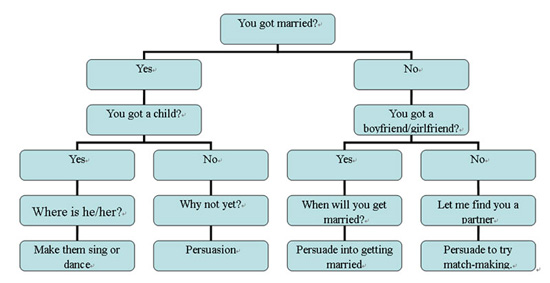
 |
| (Photo/China Daily) |
It is not uncommon in China to be besieged by members of an extended family and grilled about why you are not yet married. Spring Festival, which is round the corner, is a traditional time for family reunions and visits by relatives. But for some young people, it is also a time to "face the music" as their personal life comes up for discussions at get-togethers.
Although relatives' tittle-tattle seem like a storm in a teacup, the fear and anxiety among some young people, especially those born in the 1980s or later, have made an increasing number of young Chinese detest questions on their private life.
Some examples of the questions that the younger generation finds irritating: "How much money do you earn? Did you get a pay rise this year? Are you seeing someone? When will you get married? When do you plan to have a baby?"
Invasive as they sound to a Western ear, relationship prospects, marital status, salary and promotions are the most popular topics that parents and family friends indulge in during Spring Festival.
This year, social media weibo has even offered suggestions to people on how to dodge irritating questions from relatives. A recent online post, complete with a tree-shaped diagram called "speech outline for family reunions during Spring Festival", has been widely circulated on weibo. It empathizes with many youths' complaints and has generated a swarm of followers.
But why do parents and elderly relatives pry into young people's private life? Elderly people don't understand privacy in the same way as many of today's youth. The questions that so irritate young people is a natural expression of elderly people's love and concern for them. Many elderly people cannot even think that youths consider such questions an invasion of their privacy.
Traditionally, privacy has been a subtle and ambiguous concept for Chinese people. Some elderly people do not even consider privacy to be an important part of a person's life. In fact, they believe that people who zealously guard their privacy are selfish, less successful and conspiratorial.
Privacy is indeed an elusive concept. Alan Westin, author of Privacy & Freedom, and a pioneer in the field of research in individual privacy, says there are four basic states of privacy: solitude, intimacy, anonymity and reserve. But the notion of privacy in a Chinese family is much weaker compared to family bonds. Chinese people tend to attach more importance to group privacy - for an entire family - while tending to neglect individual privacy within households.
There is enough evidence to suggest that parents in China enter their children's rooms without knocking and are interested in every trivial matter of their life, and even read their letters without consent. Consequently, relationships and salaries, considered private matters in Western societies, become "topics of conversation" on the dinning table.
Pundits, however, say Chinese people's attitude toward privacy has changed substantially over the years, especially among the younger generation, which has become increasingly aware of an individual's private life and personal information. Lu Yaohuai, a professor at China's Central South University, has been quoted by the Economist as saying that earlier notions of privacy were based on the traditional lifestyle when several generations of an extended family lived together. Lu says that nuclear families and increased living space have increased the need of privacy in families, especially among the younger generation.
The average living space for urban Chinese, for example, increased from 3.6 square meters in 1978 to 11.4 sq m in 2003. A report published by China Index Academy in 2012 put the figure at 29.2 sq m.
Also, social transformation from collectivism to individualism has strengthened the notion of privacy among young people. Experts reckon that China is gradually moving toward a more individualistic society, in which individual privacy, freedom, independence and equality are becoming the catch phrase.
Many young people have been influenced by Western society and values where individualism is the cultural core and the byword "a man's home is his castle" illustrates the principle of individual privacy. Similarly, many young people in China enjoy being the masters of their destiny and entertain no outside intervention in their private life.
But since it is hard to change elderly Chinese people's understanding of privacy, youths have to find well-reasoned ways to narrow the value gap across generations.
Some media reports have highlighted how some youths are forced to present fake fiancs and fiances to stop their parents from nagging them to find a life partner. Such desperate acts, however, are uncalled for, because they could create long-term problems.
Young people have to understand that the advice and questions of garrulous relatives are well-intentioned. And they should realize that asking them about their marriage and career is elderly people's way of expressing their love and concern for them. So instead of being irritated by parents' and relatives' questions during family reunions, young people should learn to communicate with them, even if their beliefs and values differ.
















 Moments that melt your heart during the Spring Festival travel rush
Moments that melt your heart during the Spring Festival travel rush


![]()
